As countries around the world effectively shut down to tackle the spread of the coronavirus, the authoritarian president of Belarus was urging citizens to drink vodka – when not at work – and visit the sauna at least twice a week to stay healthy.
A global health crisis has prompted governments worldwide to impose draconian measures on the daily lives of hundreds of millions of people. The restrictions range from confinement and school closures to strict regulations on social distancing and public gatherings.
Yet in the Eastern European country of Belarus, borders remained open, and President Alexander Lukashenko remained unmoved by the coronavirus pandemic.
He has refused to implement confinement or other restrictions in the country of about 9.5 million people, reportedly suggesting that others have done so in an act of “frenzy and psychosis”.

Sports leagues in the country have carried on as normal, with the 66-year-old Lukashenko himself taking part in ice hockey matches alongside star players, in an attempt to show the public that they are “all in this together” .
He has pointed out that Russian President Vladimir Putin – his friend and closest foreign ally – has also previously taken part in ice hockey exhibition matches.
International experts have stressed that Lukashenko was taking a big risk by refusing to accept the new reality of the coronavirus pandemic, warning that the economic impact of the health crisis could be catastrophic for this relatively poor country.
As Covid-19 cases rose in Belarus, President Lukashenko was still in denial.On 28 March, he participated in an ice hockey match. During an interview with Belarus television channel ONT, he said : “There are no viruses here…did you see any of them flying around ” ? I didn’t see them either !
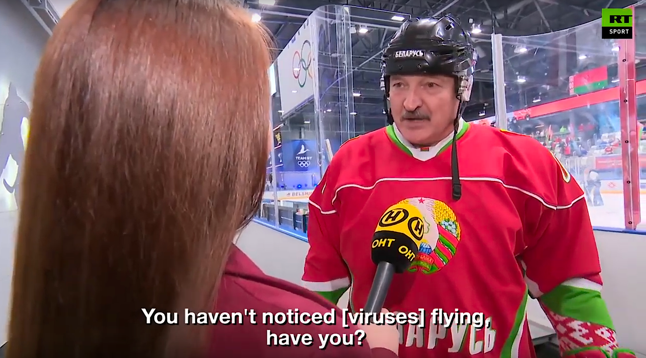
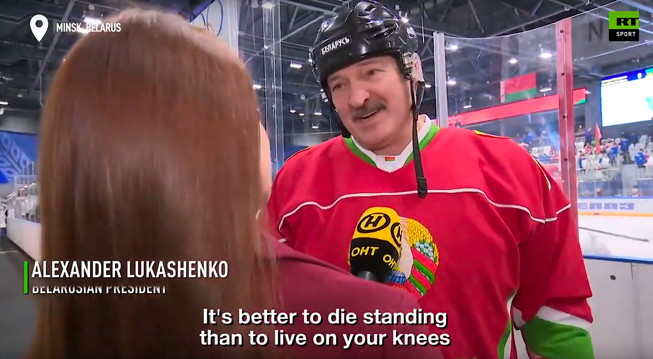
In Belarus, only hospital patients with serious symptoms were tested for Covid-19, and doctors have revealed to foreign journalists that not even all such patients were tested.
On 3 April, the President said : “Three hundred and five cases in the whole country; it’s minuscule”!
And then on 7 April, during a cabinet meeting he declared : “Today, we have 794 people in hospital, 31 on ventilators. It’s absolutely no catastrophe. An increase has been observed here, but thank God, it is not an avalanche”.
However, even official figures showed cases doubling every three days.
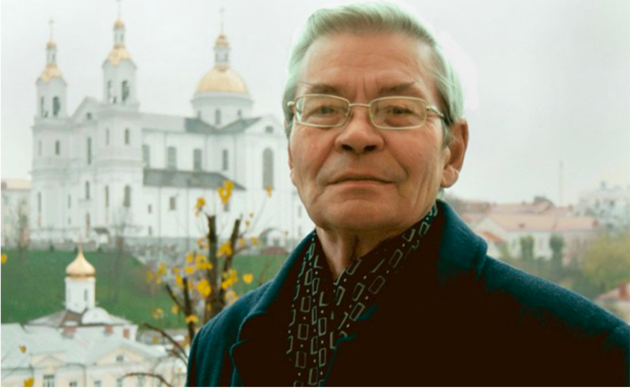
 The first victim of the virus in Belarus 75-year-old actor of the Yakub Kolas Theater, Viktor Dashkevich who presumably died in the City Clinical Hospital of Emergency Medical Care in Minsk, © kino-teatr.ru and Belarus© clinicsbel.com
The first victim of the virus in Belarus 75-year-old actor of the Yakub Kolas Theater, Viktor Dashkevich who presumably died in the City Clinical Hospital of Emergency Medical Care in Minsk, © kino-teatr.ru and Belarus© clinicsbel.com
Lukashenko has also shown insensitivity to the victims. Viktor Dashkevich, a 75-year-old actor died on 30 March after testing positive for the virus.
During a television broadcast, the President said : “We suspect this actor who died, also had pneumonia and other things, as well as this virus. He was nearly 80 years old. Why was he still walking around, and even working” ?
Another 70-year-old fatality was also shown little sympathy. This is Lukashenko’s reaction : “How can you live when you weigh 135 kilograms ? Your heart is close to failing. It hurts…it hurts ! The whole body is sick, and the virus attacks the weak, people who have no immune system”.

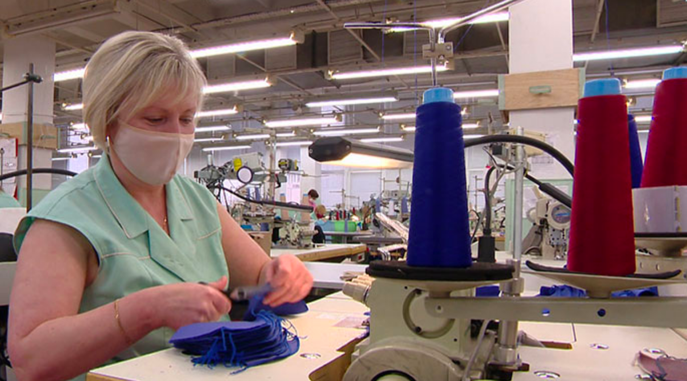
On 6 April, there were rehearsals for Victory Day celebrations. The annual military parade in May that celebrates the end of World War II, and draws huge crowds.
And as health authorities warned that cases will peak in early May, Lukashenko has declared that confinement measures and restrictions would hurt the economy. “People are ranting about quarantines, curfews and so on. Listen, it’s easy to do, we can do it overnight, but what are we going to eat” ?
Time-warped Belarus
Belarus lies between Poland and Russia, with the Ukraine to the south and the Baltic States to the north.
Alexander Lukashenko has ruled this former Soviet republic with an iron fist for the past 26 years. His authoritarian style has earned him the nickname of ‘Europe’s last dictator’.
For many he is a figure of ridicule, but his grip on power is real and at times, terrifying.
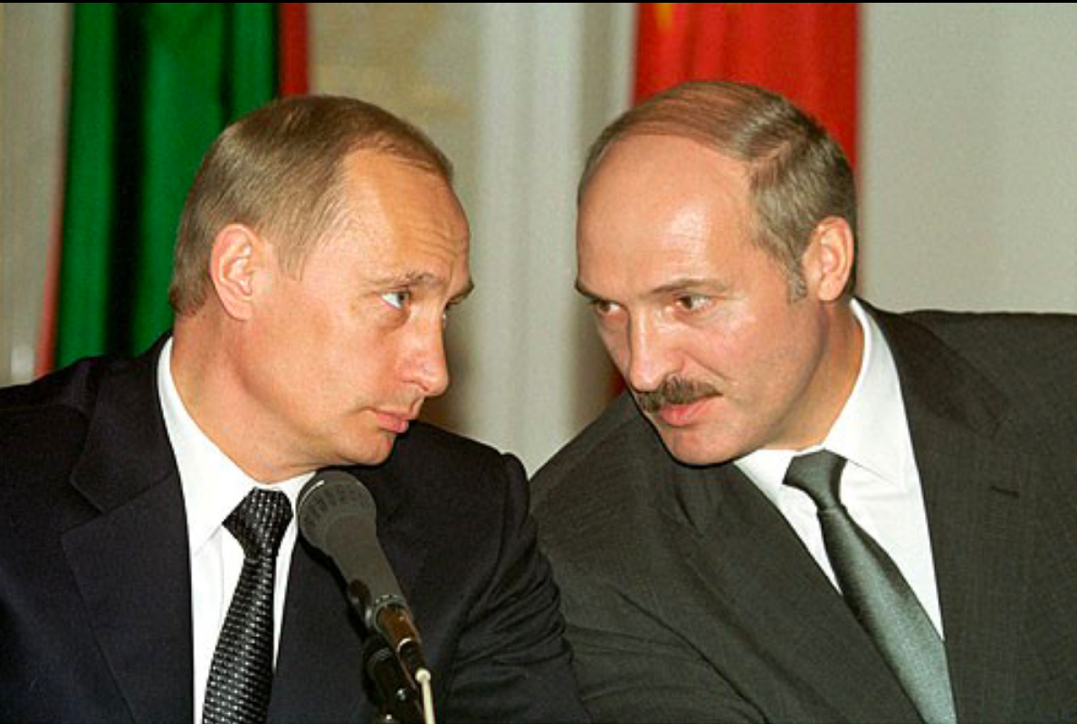 President Lukashenko with Vladimir Putin in 2002 Source Wikiwand
President Lukashenko with Vladimir Putin in 2002 Source Wikiwand
The headquarters of the State Security Service – still called the KGB – dominate the Minsk skyline. Just as its officers rule Belarusian society, there is no meaningful free speech, the media is almost entirely state-run or heavily state-controlled and internet usage is restricted and monitored. The Lukashenko regime controls almost every aspect of life here; any opposition is firmly dealt with.
Some in Belarus call him ‘Daddy’, the benevolent family patriarch who preserved a proud nation from the same downward slide as neighbours Russia. Others see the former collective farm manager as a ruthless dictator, a man whose 1950s-style Soviet-era rule is echoed by, among other and more sinister things, his Stalinist moustache.
On Lukashenko’s official website, the president is often portrayed as a jovial man of the people. One minute, he is the nation’s favourite ice hockey champion; the next, he is the energetic patriarch of a land of plenty, as happy to extol the virtues of Lenin and the collectivised economy as he is to show off Belarusian agricultural prowess to sympathetic celebrities like French actor Gerard Depardieu or American actor Steven Seagal.
Alexander Grigoryevich Lukashenko was born on August 30, 1954, in the village of Kopys in eastern Belarus, which, at the time, was of course part of the Soviet Union. His parents never married, and so his father was rarely around as he grew up. This affected him adversely with his peers in school who taunted him continually for having no father. His mother, who only died recently, in 2015, worked as a milkmaid to earn enough to make ends meet.
From a very early age, the young Lukashenko began reading the works of Lenin and dedicated himself to an in-depth study of his political thought; he aspired to become a teacher of politics later in life.
Following his secondary education at the local Alexandria school, he enrolled at the Pedagogical Institute in the city of Mogilev and graduated in 1975, after finishing a four year course.
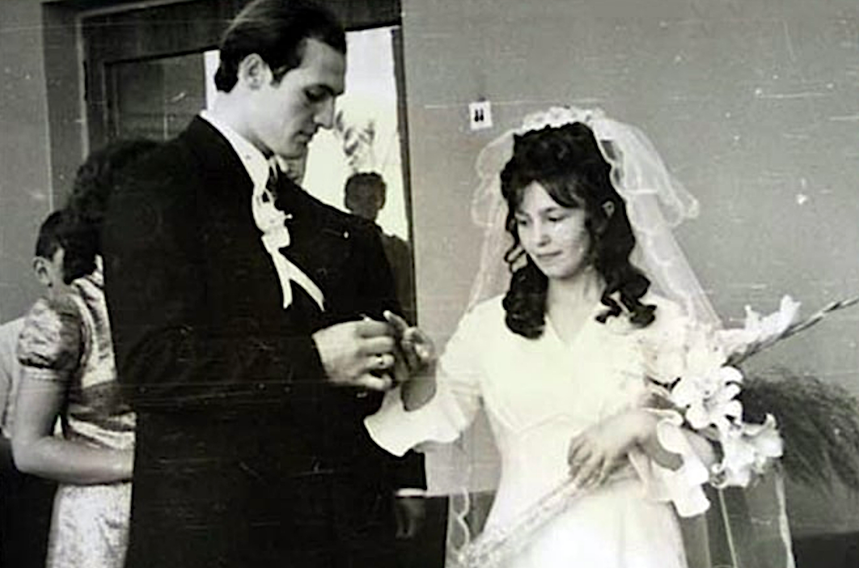 Alexander Lukashenko marries Galina Zhelnerovich © interesnyefakty.org
Alexander Lukashenko marries Galina Zhelnerovich © interesnyefakty.org
He wasted no time in marrying his high school sweetheart, Galina Zhelnerovich before the birth of his son Viktor later that year. But for reasons that have never been divulged, he and his wife separated since he became president of Belarus in 1994 and the couple have never appeared in public. Other than her wedding ceremony, there are no other known photographs of Galina Zhelnerovich, who remains married to the president but who lives separately in her home village near Shlov, in the Mogilev Region.
Aged 21, Lukashenko now had to begin his mandatory, two year national service. He was posted to a military unit of the Border Guard, where he became an instructor in its political department. Here, he had attained a position that allowed him to dispense his political knowledge and enthusiasm to his peers.
 Alexander Lukashenko in Moscow in 1994 three years after having taken up the presidency © Moscow Times
Alexander Lukashenko in Moscow in 1994 three years after having taken up the presidency © Moscow Times
After leading the local chapter of an All-Union Young Communist League in Mogilev until 1978, Lukashenko joined the ranks of the Communist Party of the Soviet Union. He also served in the Soviet army where he was named Deputy Political Officer in the Guards Motor Rifle Division which was based in Minsk.
Another happy family event marked the year 1980 : the birth of his second son, Dmitry.
For the next eight years, from 1982 through 1990, he held a number of managerial posts at collective and state farms and at a construction materials and equipment plant. In 1990, he was elected to the parliament of the Republic of Belarus.

Catapulted to the top
As a deputy, Lukashenko formed a faction which he named ‘Communists for Democracy’. He was the only deputy to vote against the December 1991 agreement that led to the dissolution of the Soviet Union and the creation of the Commonwealth of Independent States (CIS).
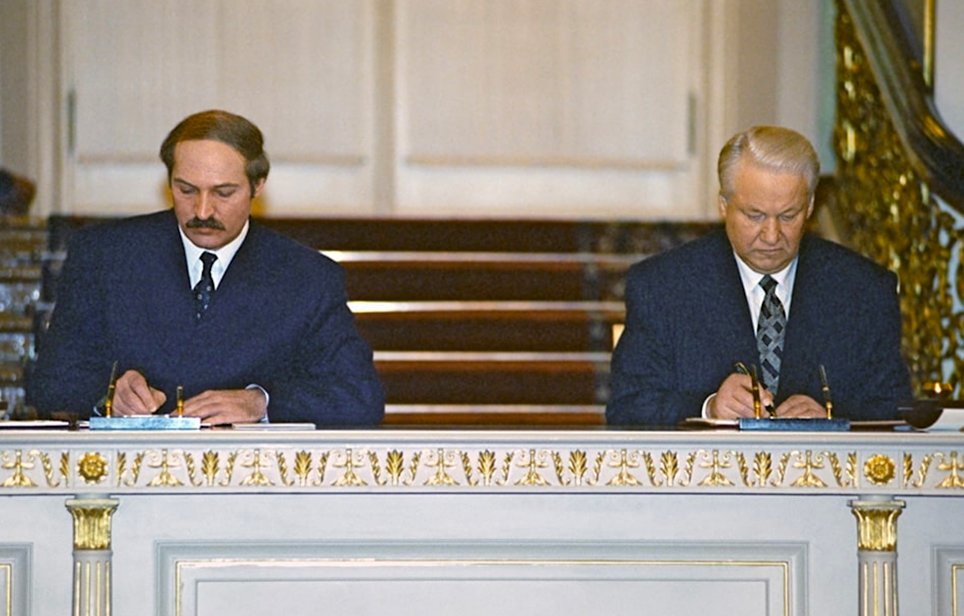 Solemn signing ceremony of the Treaty on the Formation of the Union of Russia (Yeltsin) and Belarus (Lukashenko) © interesnyefakty.org
Solemn signing ceremony of the Treaty on the Formation of the Union of Russia (Yeltsin) and Belarus (Lukashenko) © interesnyefakty.org
He maintained close ties with conservative communist factions in the newly-independent Belarus as well as groups with a similar ideology in Russia.
Over the years, Lukashenko earned a reputation as a fierce opponent of corruption which led in 1993, to his being elected chairman of the anti-corruption committee in parliament.
He lost no time in proving his reputation was well-founded : that same year, he accused not only the Supreme Soviet chairman but also some 70 senior parliamentarians, as well as the then Prime Minister, Vyacheslav Kebich of corruption and embezzlement of public funds.
The year 1994 proved a watershed moment in the modern history of Belarus. A new constitution was enacted that paved the way for the very first democratic presidential election in that country in June of that year.
Lukashenko who ran as an independent on a populist platform, and five other candidates stood in the first round. There were no outright winners and the voting went to a second round in July. This time, Lukashenko received 80.1% of the votes and thus became the first president of independent Belarus.
Following his election, Lukashenko addressed the State Duma in Moscow and made a passionate plea for the creation of a new union of Slavic States.
Fortunately, the Belarusian idealist’s words fell on deaf ears on that occasion. The Russian political elite was far too intelligent to allow itself to indulge in such ill-founded ideas.
This union has at its core the idea of Pan-Slavism and ultimately, the creation of a greater, single nation-state.
The name Slavic Union is quite explicit in itself. In its abbreviated form in Russian, it sounds as ‘CC’ in Cyrillic or ‘SS’ in the Latin alphabet, which of course, is a direct reference to the Schutzstaffel, the military and paramilitary elites of Nazi Germany.
The ideology of the Slavic Union can be summarized as neo-Nazism, antisemitism, nativism, anti-immigration and homophobia among others.
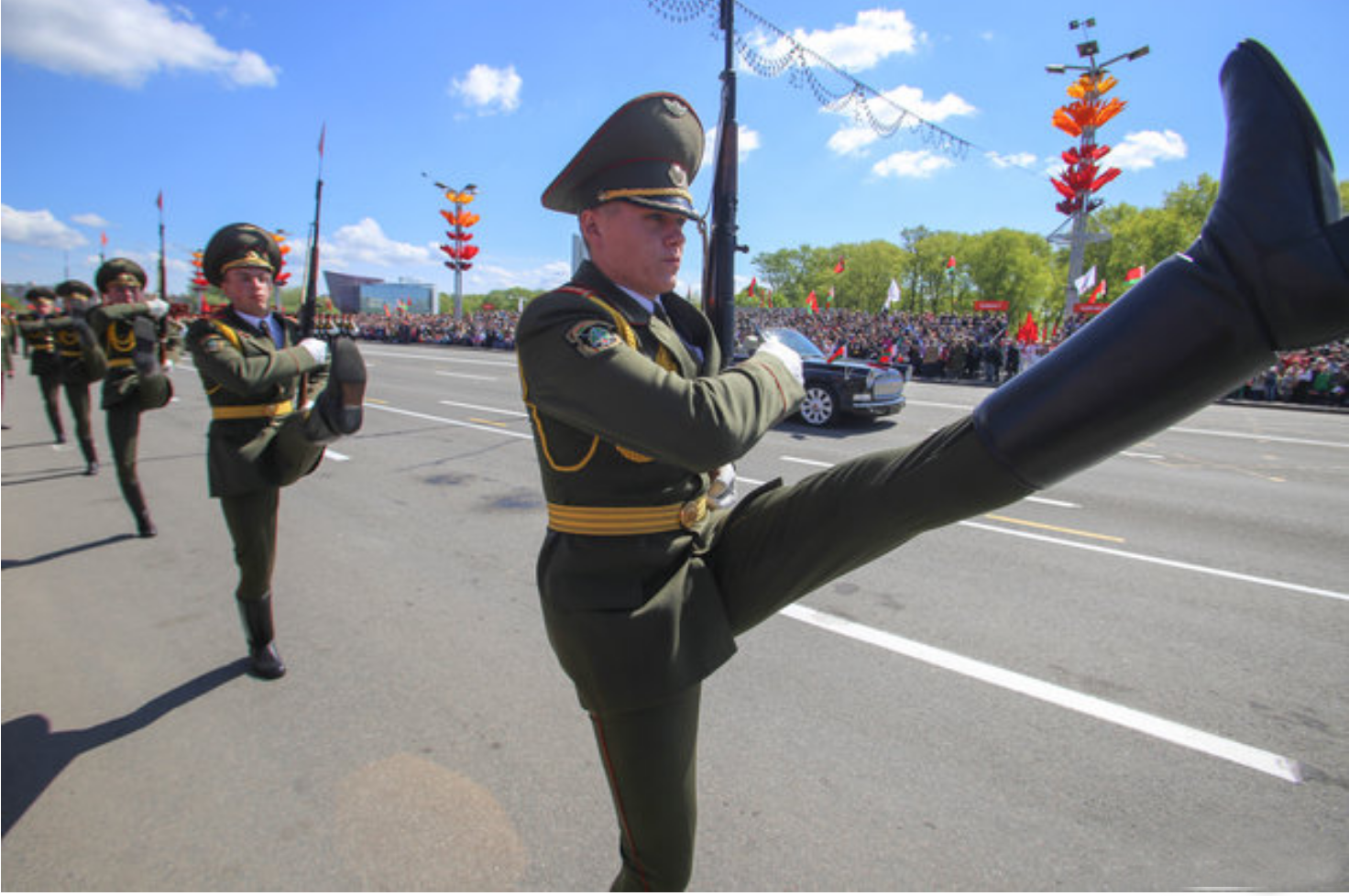 Military Parade in Minsk, 9 May 2017. Source TUT.by
Military Parade in Minsk, 9 May 2017. Source TUT.by
And a number of these traits have come to characterise Alexander Lukashenko throughout his very long tenure of office.
In May 1995, Lukashenko announced a referendum about changing the national symbols, the use of the Russian language, closer ties to Russia and other social issues. Despite strong opposition from his political rivals and even an impeachment attempt by them, the referendum was finally held in November 1996.
Following the result, an amended constitution was put to the vote and according to officials, 70,5% voted in favour.
The EU and the US however did not accept the legitimacy of the referendum.
Be that as it may, the favourable outcome of the vote dramatically increased Lukashenko’s political and economic power.
This was in fact, the true beginning of his long dictatorial rule.
Absolute power
The 1996 referendum had also extended the presidential term of office for an additional two years. Therefore, Lukashenko prepared for the campaign in September 2001, in which he promised enhanced farming and social benefits for all Belarusians.
This time there was no need for a second round; Lukashenko obtained 75.65% of the votes in the first round.
International observers, including the Organization for Security and Co-operation in Europe (OSCE) announced that the election had clearly failed to meet international standards.
As expected, this was the least of the President’s worries as he engaged into secret arms deals with Iraq and Iran following the 2003 invasion of Iraq by the US-led military coalition. There were even reports that political figures in Saddam Hussein’s inner circle had managed to obtain Belarusian passports while in Syria, and rumors were rife that Belarus would grant political asylum to Saddam and his sons.
It was at this point that American and other western leaders began referring to Belarus as ‘Europe’s last dictatorship’.
Quite unfazed by all this, Lukashenko went on national television and addressed the nation in September 2004, to propose an end to the two-year presidential term limit through a referendum.
Champion of the people, the President obtained 79.4% of the vote. Again as expected, domestic opposition groups, as well as the OSCE, the EU, and the US State Department complained that the vote had fallen well short of accepted international standards and that large scale pre-marking of ballots had taken place.
Belarus had been doing quite well under Lukashenko; it had seen spectacular economic growth, although a large part of that was in fact, due to Russian crude oil which was imported at cut-prices, refined, and then re-exported to European countries at a substantial profit.
But of course, the population need not know all this…
The transitional 2006 presidential elections were particularly controversial in Belarus’ history. Opposition parties all rallied behind one candidate : Alexander Milinkevich. Large scale street protests were being planned.
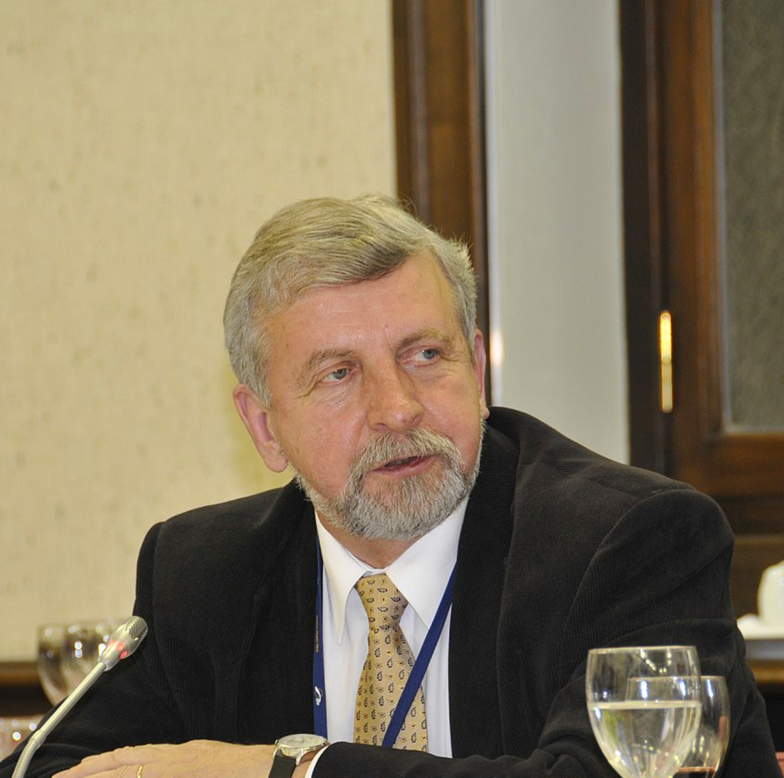
Meanwhile, polls showed Lukashenko as a favourite of about 84% of voters.
“Anyone joining an opposition protest is a terrorist and
we will wring their necks like a duck”!
( Lukashenko, March 2006 )
Notwithstanding, opposition voters took to the streets and protested against Lukashenko’s undemocratic leadership. Despite these protests, the elections went ahead and Lukashenko gained another landslide victory.
Unsurprisingly, many international organisations again deemed the elections as fundamentally flawed and pointed out glaring irregularities.
In fact, Lukashenko this time surprisingly admitted these allegations, but stated that the elections were actually rigged against him !
After his victory, he declared : “The elections have been rigged ! 93.5% have voted for me…but they say that this is not a European outcome. So we have changed that figure to 86%”!
Feeling under threat
Though the next presidential elections were scheduled for 2011, an earlier date was decided upon in order to ensure maximum participation at a time considered more convenient for voters. And so, the campaign geared up for elections set on 19 December, 2010.
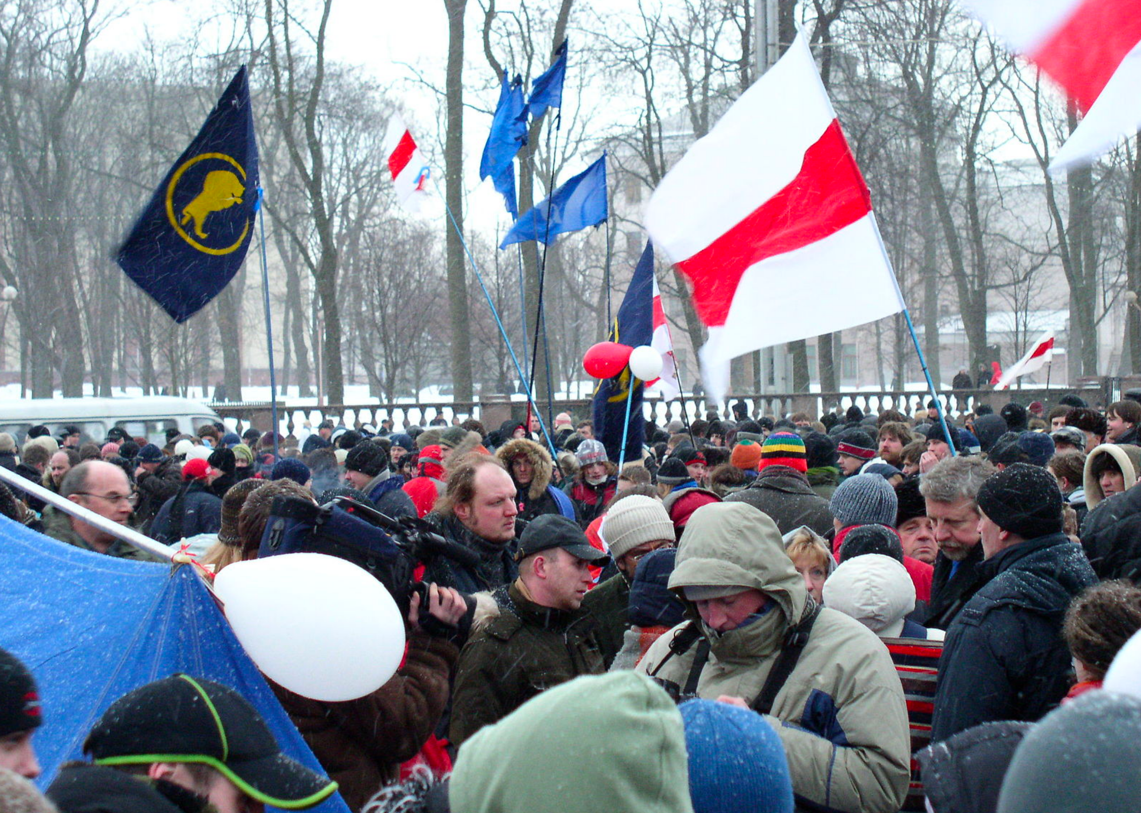 A Belarus opposition protest in Minsk © Wikicommons Alex Zelenko
A Belarus opposition protest in Minsk © Wikicommons Alex Zelenko
But Belarus is democratic only in name. Lukashenko was standing for a fourth term in office and his grip on power was as tight as ever, manipulating parliament and brainwashing his people with propaganda.
This time, he was declared the winner with 79.6% of the votes even before the polls had closed. This of course came as no surprise; vote rigging has become almost common practice for Lukashenko.
It can often appear that time has stood still in Minsk. The grand boulevards which are often empty, the intimidating and oppressive architecture which dwarfs the people that live here…it’s all still reminiscent of the Soviet era and people are somewhat uncomfortable when you mention politics.
Few people dare talk out of line; 80% are employed by the state and even in the small private sector, the state has the biggest influence. So, going against the regime means losing your job, losing your livelihood and putting your whole family at risk.
Yet on the night of the presidential election, it looked like people had finally had enough. Tens of thousands came out onto the streets to protest against the vote rigging. This was the largest demonstration Belarus had ever seen.
Opposition parties joined forces and gathered outside parliament. Spurred on by the large crowd, they called for talks with the government and demanded a second round of the election.
But Lukashenko ordered the KGB and riot police onto the streets in uncompromising response.Two prominent opposition figures, Andrei Sannikov and Vladimir Neklyaev paid a heavy price for their actions.
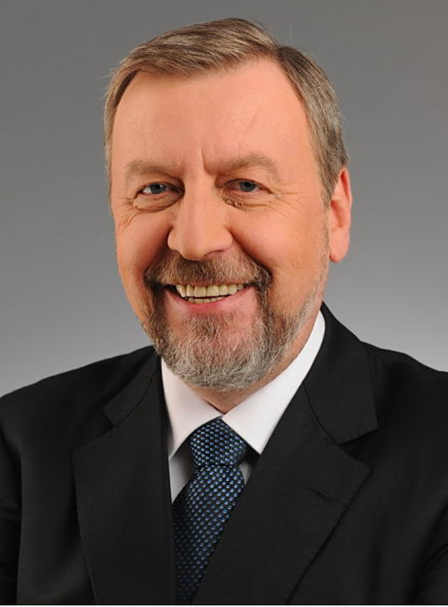
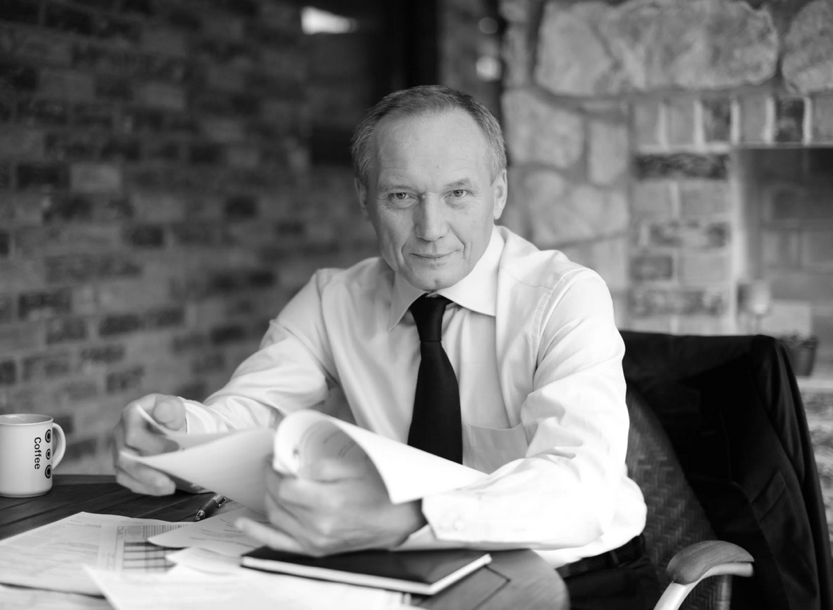
They were targeted by security forces and brutally beaten up as they made their way to join the protesters.
Thousands were arrested that night in Minsk and many more were detained in the days that followed. Some were tortured. The KGB used telephone records to trace each and every person that had used their mobile during the protest. People were locked up, issued fines and placed on a black list.
In April 2011, a bomb ripped through a Minsk metro station, just metres from Lukashenko’s office. The explosion killed 15 people. He was quick to call it terrorism, and even pinned blame on the opposition.
But what’s even stranger is that he took his youngest son, Kolya to witness the carnage. He may have wanted to show him what an enemy of the state can do to disrupt normal life.
Even more sinister are the accusations that Lukashenko might have been behind this explosion himself; a way of persuading his people they are under threat, and he is the only man who can save them.
“The opposition uses social networks to call for action…
I will look, watch…and then I will strike hard”! ( Lukashenko, June 2011)
There has been speculation about the President’s mental health for some time. Before the presidential election, a prominent human rights lawyer asked the central election committee and supreme court to look into whether Lukashenko was still fit to be commander-in-chief. But he was ignored.
Diplomatic cables released by Wikileaks show the Americans have also had their concerns, referring to him as ‘bizarre’ and ‘disturbed’.
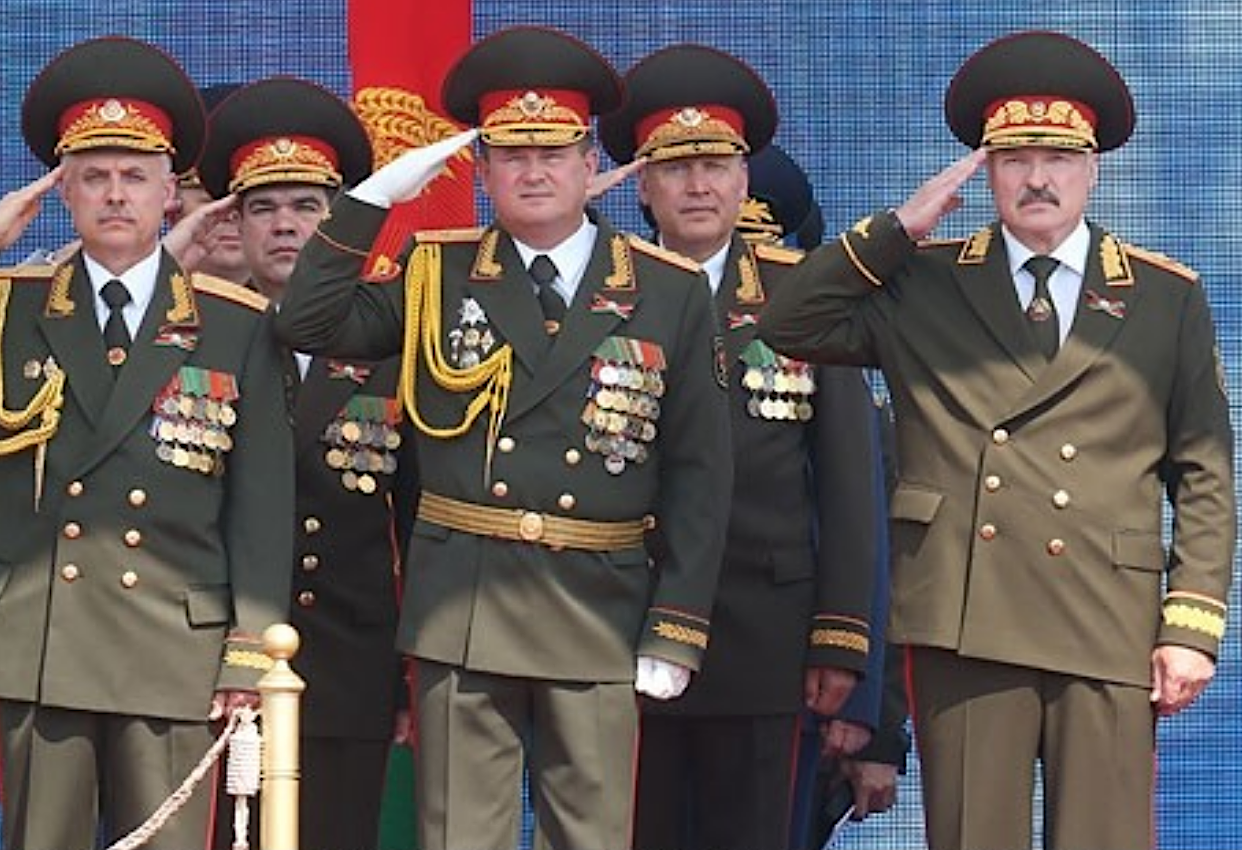 Belarus President Alexander Lukashenko during a military parade in Minsk on the occasion of Belarus’ Independence Day celebrations
Belarus President Alexander Lukashenko during a military parade in Minsk on the occasion of Belarus’ Independence Day celebrations
If Minsk feels like a step back in time, the Belarusian countryside resembles another era entirely.
On the approach to Lukashenko’s home village of Alexandria, the landscape changes dramatically. Dilapidated old shacks give way to modern and bright houses, all apparently with central heating and hot water, which is unusual in this part of the country, despite the harsh winters.
And in the centre of the village, where only 600 people live, an elegant hotel; though it is not clear who comes to visit. This really is the middle of nowhere. Perhaps Lukashenko’s ego led him to believe his home village would become a tourist hot spot. But no sign of that today.
Even the 3 million dollar bridge crossing only ten metres of river is hardly used. There has clearly been high levels of investment in the area; investment that is not matched in the rest of the country. The house in which Lukashenko lived with his mother has been completely rebuilt; he clearly looks after his own.
“Our people made their choice…they demonstrated who is
the master of the house…This is a bright and undisputed victory”.
(Lukashenko, March 2006)
The reign continues
Five years had passed. Alexander Lukashenko had to prepare himself once again for the upcoming elections in October 2015, and his fifth term as president. As widely expected, he faced unrest again.
Although he commanded the loyalty of many Belarusians, this time around, he was up against an opponent who could call upon widespread public support : Mikola Statkevich, one of Lukashenko’s most bitter political opponents.

 Mikola Statkevich © alchetron.com/.png. Kherson prison in Minsk © Wikimapia
Mikola Statkevich © alchetron.com/.png. Kherson prison in Minsk © Wikimapia
Following the police crackdown during the 2010 elections, Statkevich was arrested and later put on trial. He spent nearly five years in prison and was barred from standing for president.
He called a rally on the day before the 2015 voting and addressed thousands of his supporters.
“Thank you for finding the courage in this scared country to show your will and exercise your right to assemble in the centre of Minsk and talk about what is important to us. The nation lives for as long as there is someone fighting for it. As long as you live, Belarus lives”!
Elsewhere in the capital, Lukashenko’s small team of paid supporters made quite a contrast to the thousands who had turned out for Statkevich.
But the president does have the backing of the KGB, the militia and the army !
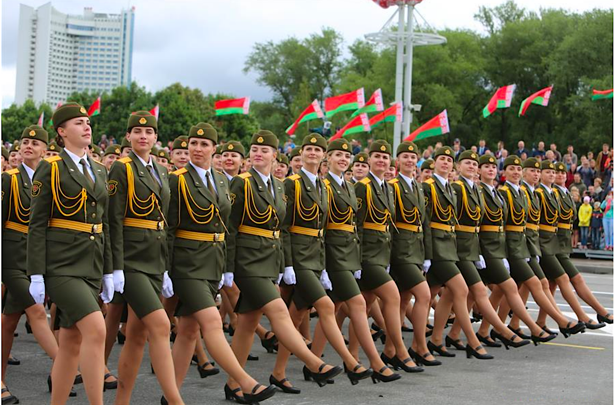

Sunday, 15 October 2015…election day. At polling stations throughout the country, local administrations organised musical entertainment, food stalls, cheap vodka and discount fruit and vegetables, which became the main reasons voters turned up.
Tatsiana Karatkevich, one of only three sanctioned candidates was chosen by the opposition to stand against Lukashenko.
But it was all rather academic as the final result was, as usual, a foregone conclusion. However, Karatkevich thought that the actual support from the people would matter more than the inevitably forged official results.
After casting her vote, she declared :
“Before this day, there was this quote that said : It doesn’t matter how people vote, it matters how people count. But today, I think it acquires a different meaning”.

Indeed. Although there were hundreds of election observers scattered throughout the country, they were not allowed to observe the all-important counting process.
By evening, the mood was sombre. Many feared that large-scale protests might arouse the unwanted attention of Vladimir Putin.
After all, it was less than one year earlier that Russian troops and paramilitary units had taken over the parliament of Crimea and captured strategic sites across the region, before installing a pro-Russian government. If necessary, the Kremlin is quite capable of staging some kind of coup or simply deciding to annex part or even the whole of the territory of Belarus.
Ironically, this is also a very important argument put forward by the regime’s propaganda. It says look at Ukraine. Democracy means war…democracy means losing territory…it means political chaos !
The choice is simple, says Lukashenko. Dictatorship or a bloody war like the one in neighbouring Ukraine.
Nonetheless, a small protest began outside the headquarters of the electoral commission.
Not far away, a giant TV screen showed Lukashenko casting his vote, accompanied by his then 11-year-old son Kolya, who many in the West believe is being groomed to take over the presidency one day.
Kolya, whose official name is Nikolai is in fact an illegitimate son of President Lukashenko. Although it remains unconfirmed, it is widely believed that his mother is Irina Abelskaya, a physician who had an alleged affair with Lukashenko when she was his personal doctor.
Next to appear on the screen was the head of Belarus’s Central Election Commission since 1996, Lidia Yermoshina. She announced :
“With reference to the army going to the polling stations in their barracks, 100% of them have voted…and first place in the election is taken by Lukashenko with 98% of the vote”!
No surprises there !
Crowds had also gathered in front of parliament in anticipation of the results. Before long and as expected, the militia appeared out of the shadows and began dispersing the crowds.
Against this background of political oppression, it might seem odd that there is a human rights NGO in Belarus. It’s called Viasna, meaning ‘spring’.
Viasna may have had its offices confiscated and even outlawed, but somehow its small team continues to agitate for change. And they certainly have their work cut out…even demonstrating is an offense.
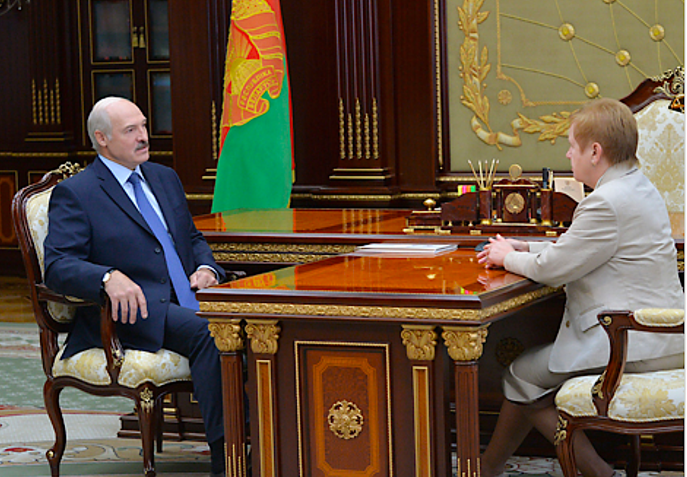 Chairperson of the Central Election Commission Lidia Yermoshina, and Belarus President Alexander Lukashenko © belarus.by
Chairperson of the Central Election Commission Lidia Yermoshina, and Belarus President Alexander Lukashenko © belarus.by
But there are far worse things than a beating by the KGB, following a street protest. Belarus, the only European country with a death penalty executes prisoners with a gunshot to the back of the head. Forced confessions and kangaroo courts are the order of the day.
According to Viasna and other international human rights groups, since Lukashenko seized power, over 300 individuals have been executed and a many others have disappeared without a trace.
The director of Viasna, Ales Bialiatski, says :
“Lukashenko is the person who ultimately can grant a pardon or refuse to do so. In accordance with Belarusian law, the president is always the one who decides the fate of a person, even if that person does not apply for pardon. And for him, knowing that he is the master of a person’s life is the most important evidence of his unlimited power”.
In 2016, amid the inflationary spiral and tumbling salaries, the economy was pushed into deep crisis. Lukashenko’s solution: a tax on the unemployed, whom he called ‘parasites’!
The ‘parasite tax’ amounted to 200 euros or 18 months unemployment benefit. Almost 500.000 people were liable for this tax and many just couldn’t pay it.
The penalty was two weeks in prison.
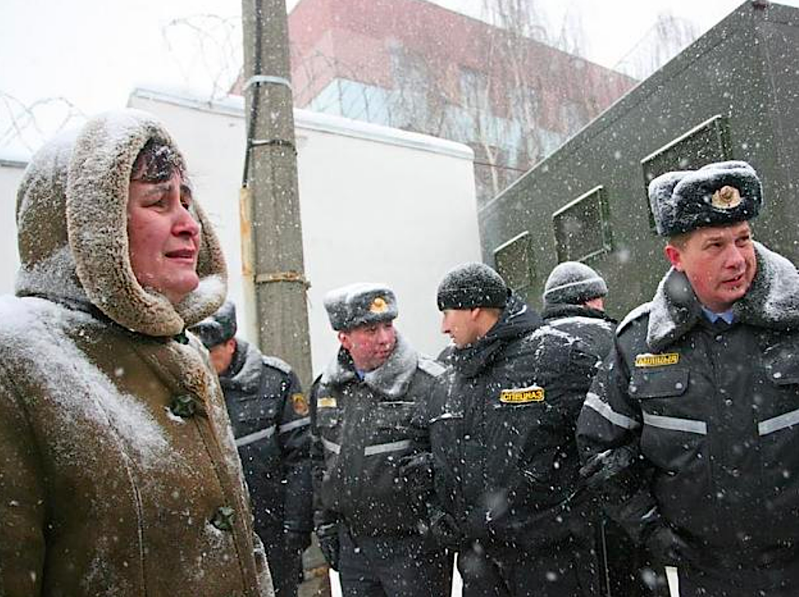 Relatives of arrested opposition members waiting for information in front of a prison in Minsk © Minsk.regiony.by
Relatives of arrested opposition members waiting for information in front of a prison in Minsk © Minsk.regiony.by
However, Lukashenko had an idea. In order to reinforce his personal image of Minsk as a communist paradise, he decided to also make it the cleanest capital in the world. Armies of unemployed, regardless of age and health were forced to clean the streets to avoid paying the ‘parasite tax’. Introduced at the beginning of 2016 by Lukashenko, it was meant to punish the unemployed.
This is of course was all part of a collective whitewashing.
But then something remarkable happened : people began to protest. Thousands came out onto the streets, and not just in Minsk, but across the country.
Demands for the abolition of the tax soon morphed into demands for democracy and as the protests escalated in March 2017, there was even talk of a ‘Belarusian Spring’.
Lukashenko was out of the country and with no one in command, the demonstrations went unchecked.
But on his return, the arrests began on a large scale and the authorities responded aggressively, especially in view of preempting a big demonstration planned towards the end of March.
A cabinet meeting was televised live during which, Lukashenko issued an ominous warning :
“We are not afraid of anyone. Any minor deviation from the law will be brutally suppressed”!
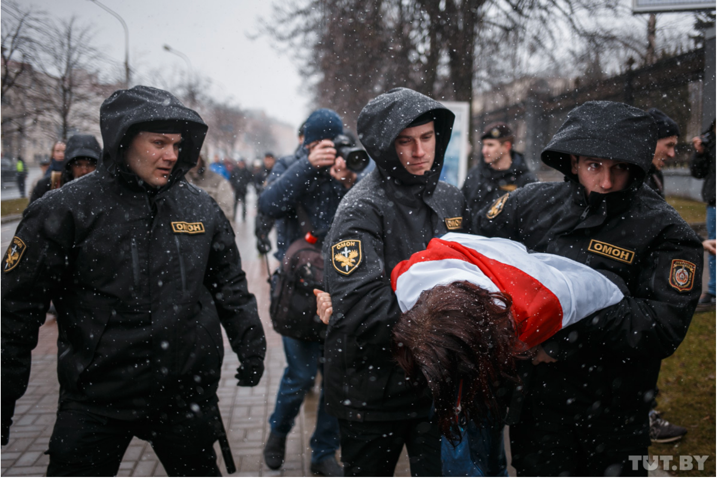 A Belarus opposition protest rally in 2019
A Belarus opposition protest rally in 2019
Lukashenko’s opponents say his disregard for human life is also epitomised by his denial of the threat still posed by the Chernobyl nuclear disaster.
In fact, one of Lukashenko’s first acts as president was to close down the ministry set up to help victims of Chernobyl.
The Chernobyl Zone is a large area that spills over the border from Ukraine into Belarus and which took 70% of the fallout. The zone will remain badly contaminated for hundreds of years. Thousands fled, leaving behind their houses and agricultural lands in the Kalinkavichy region of southern Belarus.
But for over a decade, Lukashenko’s policy had been to repopulate the zone. Under the president’s orders, previously abandoned fields in contaminated areas were being cultivated for purely economic reasons, part of a drive to make the zone profitable in a country already in desperate financial straits.
But of course, it’s the land that poses the biggest threat as radioactive elements find their way, via the food chain into the human body, giving those who have returned a dangerous dose of radiation. However, the government insisted that all was safe and denied that the very high rates of various forms of cancer in the region were in any way linked to Chernobyl.
Gazing into the future
It is perhaps unsurprising that Belarus has one of the highest suicide rates in Europe, along with the high levels of alcoholism. But take a look at Lukashenko’s official website and it would seem that things could get any better.
It shows the president smiling paternally below the national flag. There are endless, feel-good photos of the 66-year-old, keep-fit fanatic as well as videos showing him meeting other autocrats and bathing in the reflected glory of WWII veterans.
His cult of personality is reminiscent of many others before him.
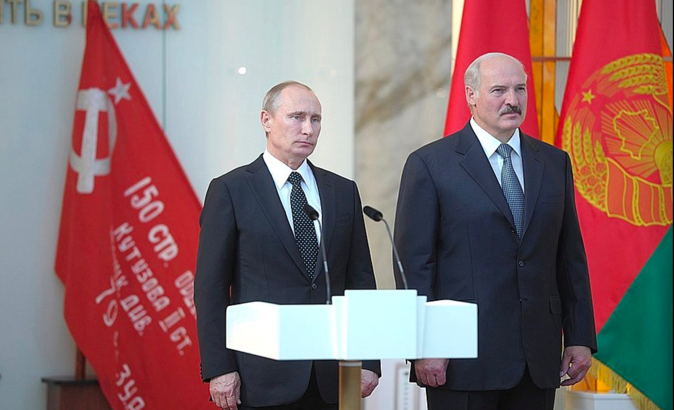
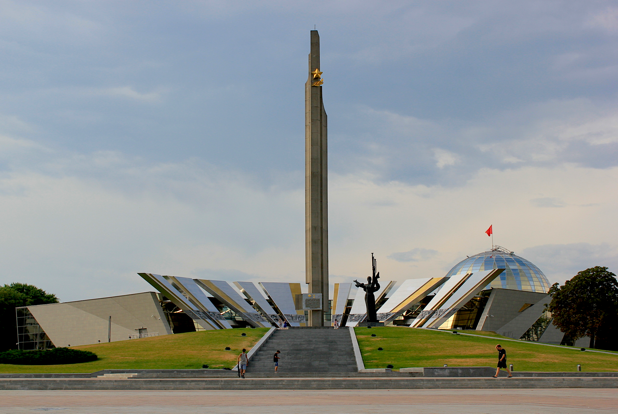 Vladimir Putin and Alexander Lukashenko attending the inauguration of a new building of the National Museum of the Great Patriotic War in 2014 © Wikicommons
Vladimir Putin and Alexander Lukashenko attending the inauguration of a new building of the National Museum of the Great Patriotic War in 2014 © Wikicommons
Lukashenko nurtures the idea that Belarus is a Soviet utopia. Nowhere is this more evident than the National Museum of the Great Patriotic War, opened in 2014 in Minsk.
But Hitler isn’t the only mustachioed dictator on display…
Even here, it’s hard to avoid Lukashenko and his heir apparent son and schoolchildren are strongly urged to visit and be fed a diet of propaganda about WWII and the triumph of Communism.
It’s all part of the propaganda machine; any report which deviates from the official line is pounced on. Journalists are routinely charged or imprisoned, yet somehow, they continue to work.
Belsat TV for example, operates out of a flat somewhere in Minsk. It was launched as far back as 2007, when demand from democratic communities in Belarus for reliable and independent news increased considerably.
Here, journalists compile reports which are sent covertly to Warsaw and then beamed back by satellite.
The broadcasts are carried by the Astra 4A Satellite and are also available on cable networks. However, not surprisingly, due to an ‘unofficial’ ban by Belarusian authorities, accessing cable or digital networks can be complicated.
Seeking support as isolation bites

Although Lukashenko has long been accused of suppressing human rights at home, Belarus’s icy relations with the West began to thaw in 2009 when he met Pope Benedict XVI at the Vatican on his first visit to Western Europe, after more than ten years of diplomatic isolation from the West.
After having issued a travel ban on him for ten years, the EU later adopted a policy of ‘change through engagement’ and it has supported economic and some political reforms in view of integrating Belarus.
Ever since the crisis in Ukraine, Lukashenko who has always been one of President Putin’s closest allies has become wary of Russia’s moves. This, together with the fall in global oil prices and other economic downturns have pushed Belarus into recession and have prompted Lukashenko to reach out to other nations.
He may have little room for manoeuvre in his relations with the West, but he has managed to forge ahead in a number of areas.
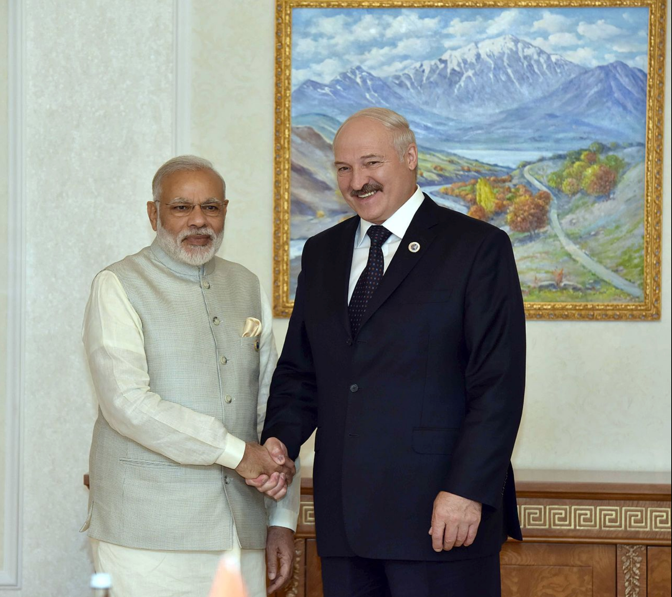 President Lukashenko with Indian Prime Minister Narendra Modi © belarus.by
President Lukashenko with Indian Prime Minister Narendra Modi © belarus.by
In 2017, Lukashenko was invited to India at a time when the two countries were celebrating 25 years of diplomatic relations. The Indian Prime Minister, Narendra Modi and the President held talks in many areas including trade, investment and defence.
At the Belt and Road Forum for International Cooperation (BRF) held in Beijing in May 2017, Chinese President Xi Jinping welcomed Lukashenko after China and Belarus established a strategic partnership for trade and investment in various areas in 2016. The two heads of state witnessed the signature of the cooperation documents.

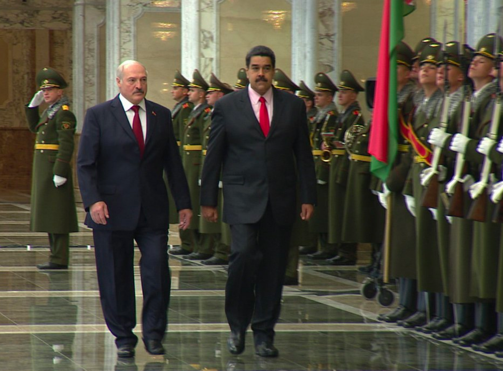
Ever since 2015, Lukashenko worked towards improving trade relations between his country and Latin America.
In October 2017, he invited Nicolas Maduro, the Venezuelan President to Minsk, and they discussed the development of cooperation in the fields of energy, agriculture as well as military ties.
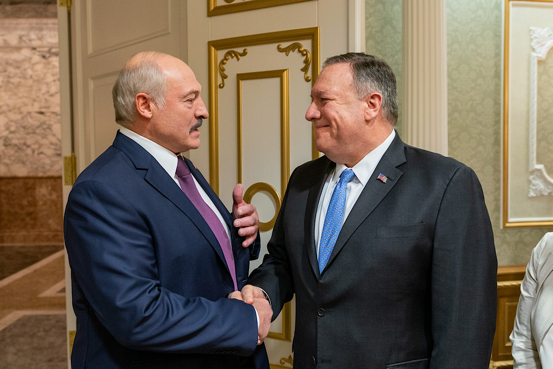
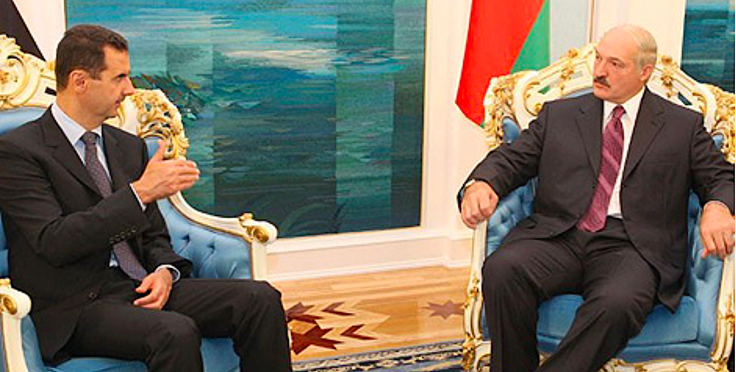
And in February 2020, US Secretary of State Mike Pompeo who was on a tour of ex-Soviet countries, met President Lukashenko in Minsk and called for real progress in their bilateral relations.
Lukashenko joked about his authoritarian rule as the two shook hands, saying :
“What makes our dictatorship different is that at the weekend everyone rests but the president works”!
Meanwhile, back at the Presidential Palace in Minsk, Alexander Lukashenko, Belarus’s first and only president has said sarcastically that he is ready to give up power :
“This is not my first term as president. I am fed up with the presidency”!
But he has also denied he is preparing his son ‘Kolya’ to succeed him.
“I promise you firmly that I will not die in the president’s chair…Secondly, I promise that I will not hold on to power for the sake of my children and hand it down to them by inheritance”.
And yet, ever since Lukashenko’s visit to the Vatican in 2009, when he took with him his then five year-old son to meet Pope Benedict XVI, Kolya has appeared regularly in public. He sits in on many state occasions, including major military events, sometimes holding a pistol, and accompanies his father on his foreign trips.
In 2012, Lukashenko and his son were welcomed in Caracas by the then Venezuelan President Hugo Chavez. It was here that the Belarusian president, perhaps inadvertently revealed his true intentions :
“You are correct in pointing out that my kid is here alongside us. This shows that we have seriously and lastingly established the foundation for our cooperation, and that in 20 to 25 years there will be someone to take over the reins of this cooperation.”
In 2015, political observers were surprised when Lukashenko took his son to the UN General Assembly in New York.
At a reception for the summit, Kolya and his father posed for a photograph with Barack and Michelle Obama.
Kolya later also accompanied his father on official trips to Syria, China, India and Pakistan among other countries.

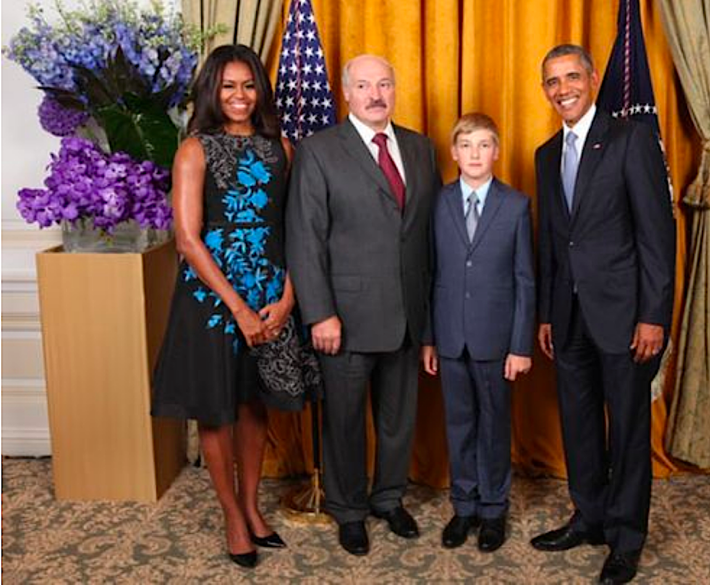
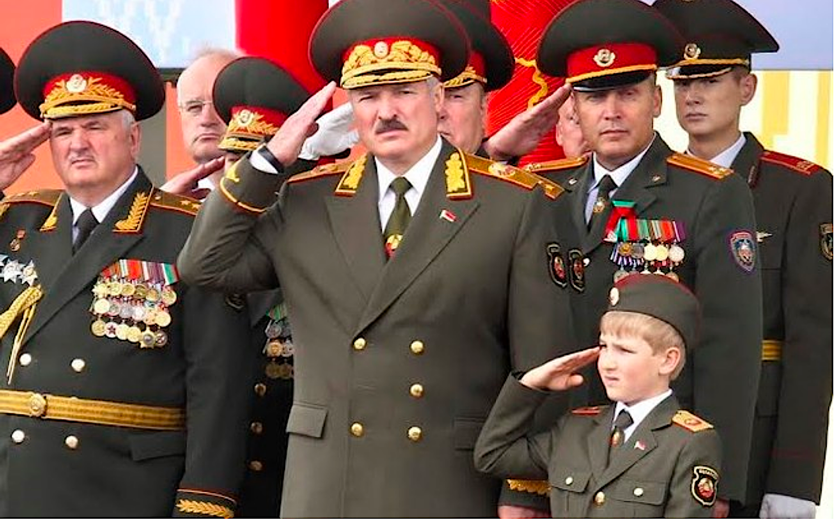
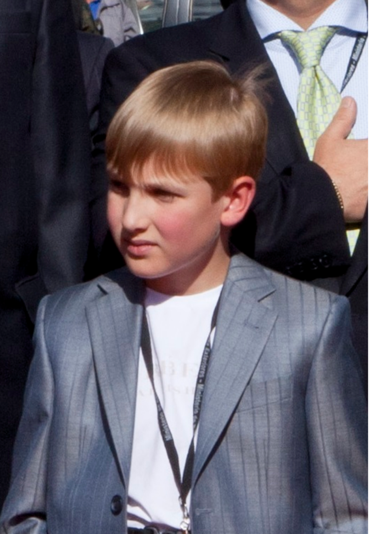

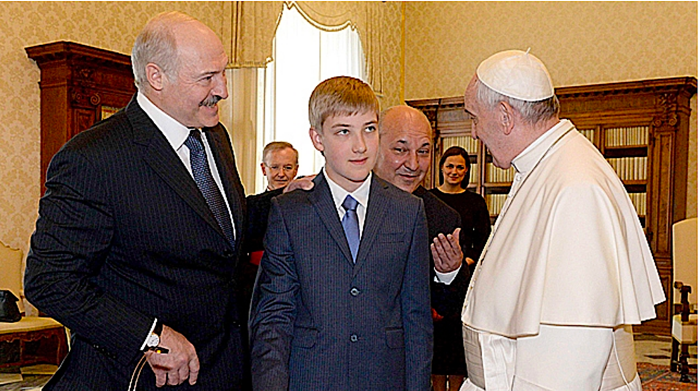
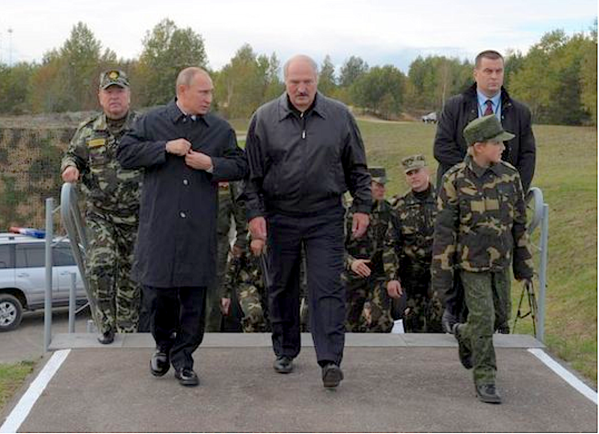
Be that as it may, the Central Election Commission has already announced that the presidential election of 2020 must take place before the last day specified by the electoral law.
There will, as usual, be opposition candidates who will attempt to take on the incumbent, including old adversaries, such as Mikola Statkevich and Tatsiana Karatkevich.
They know the ropes well by now.
So, the game is on !
But would it come as a surprise to anyone to learn that the day specified by the electoral commission is Sunday, 30 August, 2020 ?
This happens to be President Alexander Lukashenko’s birthday !
Hossein Sadre
Click here to read the 2020 May edition of Europe Diplomatic Magazine


